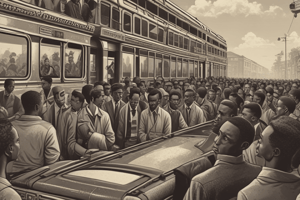Podcast
Questions and Answers
¿Qué representa el concepto de la naturaleza humana en relación a la libertad?
¿Qué representa el concepto de la naturaleza humana en relación a la libertad?
Según la información, ¿cómo se describe la relación entre la libertad, la inteligencia y la voluntad?
Según la información, ¿cómo se describe la relación entre la libertad, la inteligencia y la voluntad?
¿Cuál es la característica principal de la libertad, según el texto?
¿Cuál es la característica principal de la libertad, según el texto?
¿Cómo se relaciona la libertad con la autorrealización existencial y ética de la persona?
¿Cómo se relaciona la libertad con la autorrealización existencial y ética de la persona?
Signup and view all the answers
¿Qué se entiende por la dimensión objetiva de la libertad en el personalismo integral de J.M. Burgos?
¿Qué se entiende por la dimensión objetiva de la libertad en el personalismo integral de J.M. Burgos?
Signup and view all the answers
Según J.M. Burgos, ¿en qué reside el núcleo o esencia de la libertad?
Según J.M. Burgos, ¿en qué reside el núcleo o esencia de la libertad?
Signup and view all the answers
De acuerdo con Ramón Ayllón, ¿qué significa la capacidad de autodominio?
De acuerdo con Ramón Ayllón, ¿qué significa la capacidad de autodominio?
Signup and view all the answers
En relación al autodominio, ¿cómo se define la libertad moral?
En relación al autodominio, ¿cómo se define la libertad moral?
Signup and view all the answers
Si una persona no demuestra control en sus acciones, ¿qué se puede concluir?
Si una persona no demuestra control en sus acciones, ¿qué se puede concluir?
Signup and view all the answers
En relación a las libertades, ¿cuál es la diferencia entre la libertad de coacción y la libertad de querer?
En relación a las libertades, ¿cuál es la diferencia entre la libertad de coacción y la libertad de querer?
Signup and view all the answers
¿Qué concepto, según el texto, niega la libertad al afirmar que todo está predeterminado por factores físicos, biológicos, sociales o psicológicos?
¿Qué concepto, según el texto, niega la libertad al afirmar que todo está predeterminado por factores físicos, biológicos, sociales o psicológicos?
Signup and view all the answers
¿Cuál de las siguientes afirmaciones es FALSA en relación al biologicismo?
¿Cuál de las siguientes afirmaciones es FALSA en relación al biologicismo?
Signup and view all the answers
El historicismo se caracteriza por:
El historicismo se caracteriza por:
Signup and view all the answers
Según el texto, ¿cuál de los siguientes aspectos representa una crítica al Positivismo jurídico?
Según el texto, ¿cuál de los siguientes aspectos representa una crítica al Positivismo jurídico?
Signup and view all the answers
La concepción del Existencialismo se caracteriza por:
La concepción del Existencialismo se caracteriza por:
Signup and view all the answers
¿Cuál de las siguientes concepciones afirma que el hombre no tiene una naturaleza fija?
¿Cuál de las siguientes concepciones afirma que el hombre no tiene una naturaleza fija?
Signup and view all the answers
El libertinaje, según el texto, se caracteriza por:
El libertinaje, según el texto, se caracteriza por:
Signup and view all the answers
¿Cuál de las siguientes afirmaciones es correcta en relación al determinismo?
¿Cuál de las siguientes afirmaciones es correcta en relación al determinismo?
Signup and view all the answers
El texto menciona dos concepciones erróneas sobre la libertad. ¿Cuáles son?
El texto menciona dos concepciones erróneas sobre la libertad. ¿Cuáles son?
Signup and view all the answers
Según el texto, el Positivismo jurídico niega la naturaleza humana al:
Según el texto, el Positivismo jurídico niega la naturaleza humana al:
Signup and view all the answers
Flashcards
Determinismo
Determinismo
Teoría que sostiene que todo está predeterminado, negando la libertad humana.
Libertinaje
Libertinaje
Visión que sobrevalora la libertad, negando la naturaleza humana.
Concepción biologicista
Concepción biologicista
Teoría que sostiene que los humanos actúan solo por biología e instintos.
Historicismo
Historicismo
Signup and view all the flashcards
Positivismo jurídico
Positivismo jurídico
Signup and view all the flashcards
Existencialismo
Existencialismo
Signup and view all the flashcards
Crítica al determinismo
Crítica al determinismo
Signup and view all the flashcards
Crítica a la concepción biologicista
Crítica a la concepción biologicista
Signup and view all the flashcards
Crítica al historicismo
Crítica al historicismo
Signup and view all the flashcards
Crítica al positivismo jurídico
Crítica al positivismo jurídico
Signup and view all the flashcards
Libertad humana
Libertad humana
Signup and view all the flashcards
Ser libre
Ser libre
Signup and view all the flashcards
Rol de la libertad
Rol de la libertad
Signup and view all the flashcards
Dimensiones de la libertad
Dimensiones de la libertad
Signup and view all the flashcards
Núcleo de la libertad
Núcleo de la libertad
Signup and view all the flashcards
Autodominio
Autodominio
Signup and view all the flashcards
Autodominio ontológico
Autodominio ontológico
Signup and view all the flashcards
Libertad de coacción
Libertad de coacción
Signup and view all the flashcards
Libertad de querer
Libertad de querer
Signup and view all the flashcards
Libertad interna en prisión
Libertad interna en prisión
Signup and view all the flashcards
Study Notes
Libertad y Responsabilidad: Libertad y Realización Personal
-
Concepciones erróneas de la libertad: Two common errors exist: determinism (everything is predetermined, denying human freedom) and extreme existentialism (overvaluing freedom, denying human nature).
-
Determinism: This theory asserts that all actions are determined by prior physical, biological, social, or psychological factors. It denies human freedom. Critiques of determinism highlight that while external factors influence us, humans retain the power of self-determination.
-
Biological Determinism: This perspective claims humans primarily act based on biology and instincts. It is criticized for reducing humans to their physical aspects and neglecting reason and freedom.
-
Historicism: This viewpoint proposes that human nature is not fixed but shaped entirely by history, denying a stable human essence. Critiques argue that freedom requires an underlying foundation, which this view lacks.
-
Positivist Jurisprudence: This approach focuses only on established laws, disregarding underlying human nature. This view is criticized because it reduces morality to rapidly changing societal norms.
-
Existentialism: Existentialism emphasizes individual freedom and responsibility, prioritizing personal choice in shaping one's identity. Critiques suggest this view ignores the inherent human nature that should be considered during the exercise of free will.
Additional Concepts
-
Freedom and Self-Determination: Humans possess the ability to choose and determine their paths, though faced with limitations.
-
Freedom and Essence: Freedom is exercised within the parameters of one's essential nature.
-
The Nature of Human Freedom: Understanding freedom means recognising the multifaceted nature of human capabilities and not seeing them as separated from intelligence and will. Freedom and self-determination work together towards personal growth.
-
Dimensions of Freedom: Freedom has objective (external choices) and subjective (internal choice) dimensions, as proposed by J.M. Burgos, each playing a role in shaping personal identity.
-
Freedom and Self-Realization: Freedom allows individuals to reach their potential, enabling them to exercise personal capabilities and contribute to their environment.
-
Freedom and the Good: Freedom is not unrestricted; it is directed towards the ultimate goals and good of individuals, as described by Thomas Melendo.
-
Freedom and Morality: Freedom must be guided by morality, as correctly indicated by the previous points, to achieve one's full potential, not considered in a vacuum by itself, but guided by principles of goodness.
-
Limitations on Freedom: Freedom is not absolute. External factors, encompassing physical, moral, and psychological constraints impact the full exercise of human liberty.
-
The Nature of the Truth: Truth and the right decisions empower individual freedoms and guide them to achieving their potential.
Studying That Suits You
Use AI to generate personalized quizzes and flashcards to suit your learning preferences.
Related Documents
Description
Este cuestionario explora las concepciones erróneas de la libertad, como el determinismo y el historicismo. También aborda cómo estas teorías impactan la realización personal y la capacidad de autodeterminación. Pon a prueba tu comprensión sobre estos conceptos filosóficos fundamentales.




